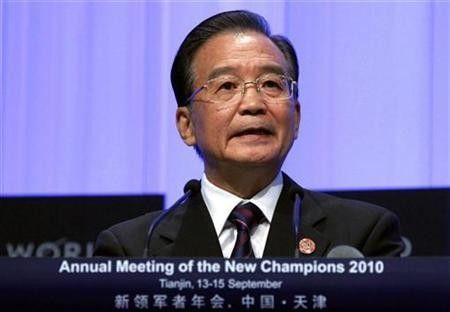China begins tackling inflation

Chinese Premier Wen Jiabao said on Wednesday that the State Council, China’s cabinet, is drafting measures to contain rising commodity prices.
The steps to curb rising consumer prices include increasing food supplies and other necessities, rising subsidies for low-income families and initiating more targeted policy measures to keep the market in order, according to a government statement.
We need to understand the importance and urgency of stabilizing market prices and take forceful measures, the statement said.
The statement informed that the State Council wants to stabilize grain, edible oil, sugar and cotton markets. Further, it promised a severe clampdown on price speculation and to punish those found hoarding commodities in a bid to push up prices.
When it is necessary, contemporary measures could be taken to interfere with the prices of some important daily necessities, the statement added.
However, the government statement did not mention anything on the monetary policy, about which the markets have expressed concerns.
A surge in food prices propelled Chinese consumer prices to a 25-month high in October, despite the government's efforts to control inflation.
Chinese consumer price index (CPI), a major gauge of inflation, rose to 4.4 percent in October compared with 3.6 percent in September, the National Bureau of Statistics (NBS) said.
Food prices in the world’s second largest economy went up by 10.1 percent in October year-on-year. Food prices continued to increase from 5.7 percent in June to 8 percent in September.
From January to October, China’s CPI stood at 3 percent, hitting the government target rate for 2010.
The People's Bank of China raised interest rates by 0.25 percent in October for the first time in three years to tame inflation. Recently, the central bank ordered banks to increase reserves in a move to curb lending.
However, a note from Capital Economics said that more monetary tightening is expected in China by the end of the year, as the surging loan growth raises more concerns than food price inflation.
“Consumer price inflation rose more than expected last month, but it continues to be solely a food price problem. Of more concern is that loan growth has not slowed, despite strong signals from the government that it wants credit policy to tighten,” Capital Economics said.
Chinese bank lending in October stood at 587.7 billion yuan ($88.5 billion), up from 253 billion yuan ($38.1 billion) in October last year, the People's Bank of China (PBOC) said.
Also, Chinese consumer confidence fell in the third quarter, recording a drop for the first time in six quarters, amid growing inflation concerns.
The consumer confidence index in China dropped 5 points to 104 in July-September on quarterly basis, the China Economic Monitoring & Analysis Center affiliated with the National Bureau of Statistics (NBS) said on Wednesday.
© Copyright IBTimes 2025. All rights reserved.





















